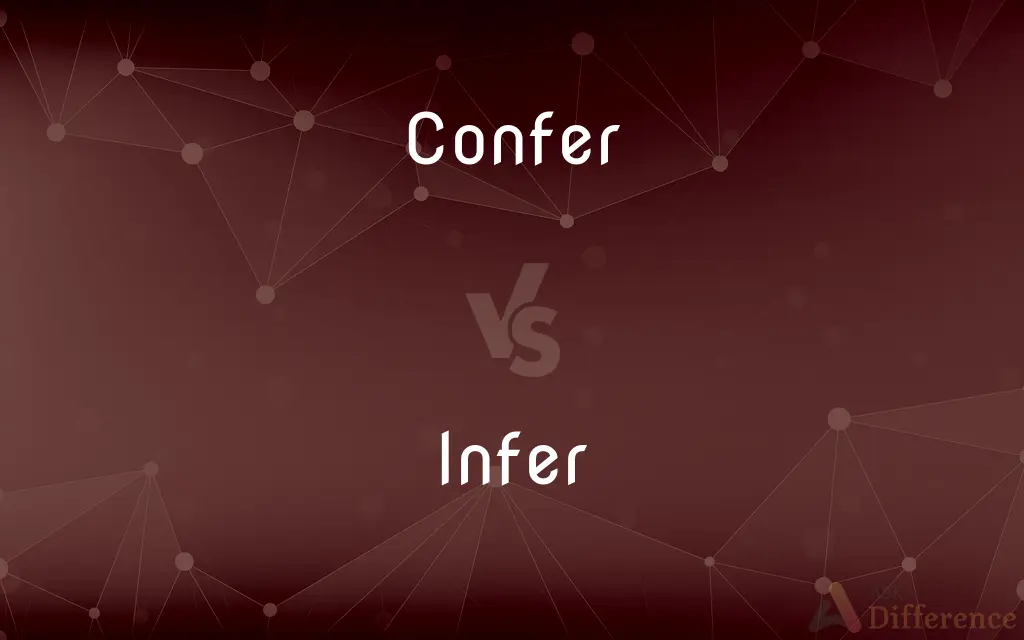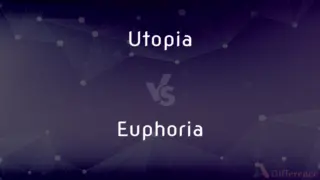Confer vs. Infer — What's the Difference?
By Tayyaba Rehman & Urooj Arif — Updated on March 1, 2024
"Confer" means to grant or bestow something, or to have discussions, while "infer" is the process of deducing or concluding information from evidence and reasoning.

Difference Between Confer and Infer
Table of Contents
ADVERTISEMENT
Key Differences
Confer involves either the act of granting something, like an award or degree, to someone, or the process of having discussions or consultations on a particular matter. Infer, in contrast, is a cognitive process where conclusions are drawn from available evidence and reasoning.
When people confer, they exchange ideas, deliberate on issues, or make decisions through discussion. For example, a university may confer a degree on a student, or colleagues may confer to decide on a project's direction. Infer about using the information you have to deduce something you don't have direct evidence for. For instance, if you see someone with an umbrella that is wet, you might infer that it's raining outside, even if you haven't seen the rain yourself.
Confer implies a direct, often intentional action between people or institutions, infer is an internal process of reasoning that may or may not involve direct evidence. Confer is about giving or discussing, whereas infer is about deducing or concluding based on the given data.
The act of conferring can involve multiple parties and is often a part of formal or informal gatherings where decisions are made or honors are given. Inference, however, is a personal or collective reasoning process that does not necessarily involve an exchange between individuals.
Both confer and infer play crucial roles in communication and knowledge. Confer enables collaboration and recognition, fostering decision-making and innovation. Infer allows individuals to draw conclusions and make decisions based on the information at hand, even when some data might be missing.
ADVERTISEMENT
Comparison Chart
Definition
To grant something or have discussions.
To deduce or conclude from evidence.
Process
Interactive or ceremonial.
Cognitive reasoning.
Involvement
Multiple parties or individuals.
Individual or collective minds.
Example
Confer a degree, confer on a decision.
Infer the weather from clues.
Outcome
Decision, agreement, or award.
Conclusion or understanding.
Compare with Definitions
Confer
To discuss something with others.
The managers will confer tomorrow to finalize the strategy.
Infer
Can be based on indirect evidence.
He inferred the company's success from its stock market performance.
Confer
Can result in a decision or agreement.
After conferring with the team, the coach made the final call.
Infer
Requires a logical thought process.
The scientist inferred a new theory from the experimental data.
Confer
Involves a formal or informal exchange of views.
The diplomats conferred on the treaty terms for hours.
Infer
To deduce or conclude information from evidence.
From the tracks, the hunter inferred the presence of deer.
Confer
Often used in formal contexts.
The organization conferred awards to outstanding volunteers.
Infer
Often used in analytical contexts.
The readers were left to infer the protagonist's fate.
Confer
To grant or bestow a title, degree, or benefit.
The university conferred an honorary degree on the author.
Infer
Involves reasoning and analysis.
She inferred his displeasure from his terse reply.
Confer
To bestow (an honor, for example)
Conferred a medal on the hero.
Infer
To conclude from evidence or by reasoning
"For many years the cerebral localization of all higher cognitive processes could be inferred only from the effects of brain injuries on the people who survived them" (Sally E. Shaywitz).
Confer
To invest with (a characteristic, for example)
A carefully worded statement that conferred an aura of credibility.
Infer
To involve by logical necessity; entail
"Socrates argued that a statue inferred the existence of a sculptor" (Academy).
Confer
To meet in order to deliberate together or compare views; consult
Conferred with her attorney.
Infer
Reason by deduction; establish by deduction
Confer
(transitive) To grant as a possession; to bestow.
The college has conferred an honorary degree upon the visiting Prime Minister.
Infer
Draw from specific cases for more general cases
Confer
(intransitive) To talk together, to consult, discuss; to deliberate.
They were in a huddle, conferring about something.
Infer
Guess correctly; solve by guessing;
He guessed the right number of beans in the jar and won the prize
Confer
Have a conference in order to talk something over;
We conferred about a plan of action
Infer
Believe to be the case;
I understand you have no previous experience?
Confer
Compare (used in texts to point the reader to another location in the text)
Common Curiosities
Can infer lead to incorrect conclusions?
Yes, if the evidence or reasoning is flawed, infer can lead to incorrect or misleading conclusions.
What is the main difference between confer and infer?
Confer involves granting or discussing, while infer involves deducing conclusions from evidence.
Is infer always a solitary process?
While infer often involves individual reasoning, groups can also collectively infer conclusions from shared evidence.
How does confer contribute to decision-making?
Confer facilitates collective deliberation and exchange of ideas, leading to informed decisions and agreements.
Is formal education required to confer something?
Formal education is not always required; confer can also refer to giving advice, rights, or honors in various contexts.
How do you ensure accuracy when inferring?
Ensuring accuracy involves careful analysis of evidence, avoiding biases, and considering multiple perspectives or sources of information.
Can confer involve only two people?
Yes, confer can involve as few as two people discussing or deciding on something.
How does culture impact the process of conferring?
Cultural norms and values can influence the manner, formality, and context in which honors, decisions, or discussions are conferred.
How can miscommunication affect conferring?
Miscommunication can lead to misunderstandings, incorrect decisions, or conflicts in the process of conferring.
Is it possible to infer without direct observation?
Yes, inferring often involves drawing conclusions without direct observation, using indirect evidence and logical reasoning.
What role does inference play in scientific research?
Inference is crucial in scientific research, allowing scientists to draw conclusions from experimental data and hypothesis testing.
What skills are important for effective inference?
Critical thinking, analytical skills, and the ability to evaluate evidence are important for making accurate inferences.
Can technology confer benefits?
Yes, technology can confer benefits such as improved efficiency, access to information, and enhanced communication.
Can one infer meaning in literature?
Yes, readers often infer meanings, themes, and intentions in literature based on textual evidence and their interpretation.
How do confer and infer contribute to knowledge?
Confer facilitates the exchange and creation of knowledge through discussion, while infer helps individuals and groups draw conclusions and expand understanding based on evidence.
Share Your Discovery

Previous Comparison
Happy vs. Cheer
Next Comparison
Utopia vs. EuphoriaAuthor Spotlight
Written by
Tayyaba RehmanTayyaba Rehman is a distinguished writer, currently serving as a primary contributor to askdifference.com. As a researcher in semantics and etymology, Tayyaba's passion for the complexity of languages and their distinctions has found a perfect home on the platform. Tayyaba delves into the intricacies of language, distinguishing between commonly confused words and phrases, thereby providing clarity for readers worldwide.
Co-written by
Urooj ArifUrooj is a skilled content writer at Ask Difference, known for her exceptional ability to simplify complex topics into engaging and informative content. With a passion for research and a flair for clear, concise writing, she consistently delivers articles that resonate with our diverse audience.














































